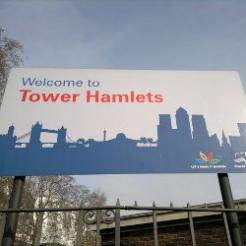Tower Hamlets council consistently ignored or overruled its own grantmaking guidelines when awarding grants to charities in the borough, an investigation instigated by the government has found.
PricewaterhouseCoopers (PwC) inspectors were appointed in April to examine allegations of “governance failures, poor financial management and fraud” in the east London borough.
The accusations came to light in a Panorama investigation, which alleged that the Bangladesh-born mayor of Tower Hamlets, Lutfur Rahman, had more than doubled funding recommended by council officers for Bengali-run charities in return for votes.
Rahman, the borough's first directly-elected Asian mayor who contested the election as an independent, strenuously denied any wrongdoing but after the programme aired Communities and Local Government Secretary Eric Pickles announced an investigation and appointed PwC to the task.
In a statement to the House of Commons this afternoon following the publication of PwC’s report today, Pickles said he would send commissioners in to the council to take control of some functions.
He said he did not know whether or not the PWC report amounted to evidence of fraud, but he would send it to the police anyway. He said the report exposed cronyism “risking the corrupt spending of public funds”.
Grants one of four areas examined
The local authority’s “payments of grants and connected decisions” was one of four areas examined in the PwC report, Best Value Inspection of the London Borough of Tower Hamlets.
The investigation centred on the distribution of around £12m across five major grant programmes from 25 October 2010 to 4 April 2014.
The programmes were Mainstream Grants (MSG) 2012-2015 (including Prevention Health and Wellbeing); the 954 Fund; the Community Faith Buildings Support Scheme; Grantmaking in Youth and Connexions Services, and Community Chest/Community Events.
The investigators concluded: “In relation to the matter of grantmaking, we conclude that the authority is failing to comply with its best value duty.”
They identified a number of failings evident in grantmaking processes, including: a lack of transparency over the rationale for grant decisions; the awarding of grants to organisations that were initially deemed ineligible; the purported application of “local knowledge” to veto award recommendations from officers; and the failure to commission an independent review of grantmaking processes despite being advised to do so.
In some cases PwC noted the complete absence of application evaluation processes or, where they existed, their overriding at the discretion of council members.
Gaps were also identified in the monitoring of performance of grant recipients.
Mayor’s involvement in awarding grants
PwC also scrutinised the level of mayoral involvement in grantmaking. They reported:
“In interview, the Mayor told us that he had not been involved in the detail of awards, although he had kept abreast of things generally through occasional high-level discussions with one member in particular.
“This is somewhat at odds with an email dated 8 August 2012, shortly after the initial circulation of the original officer recommendations, which stated that 'the Mayor has requested a vastly expanded Appendix 1'.
“We also note that a press statement dated 1 April 2014 put out by the Mayor’s office in response to the BBC Panorama programme included an assertion to the effect that the Mayor, acting within his powers, had intervened in 32 specific cases (details of some of which were also given). We consider it likely that the 32 cases referred to in the press statement concern largely the same applicants as the 32 applicants, included in the final award, who received an increase without requesting that their awards be reviewed.
“In response to our request for clarification of whether or not the Mayor intervened in the manner suggested in the press statement, neither the Mayor’s office nor the Authority has been able to shed any further light on the matter.”
Property disposals and PR spending
PwC also found the council failed to comply with its best value duty in various property transactions, and in spending on publicity. On the latter it said: “The clear implication is that Authority monies were spent inappropriately on what amounted to political advertising for the benefit of the Mayor.”
However, PwC did not find that the council failed to comply with its best value duty in relation to contracting.
Its inspection did not directly consider whether grants were awarded in return for election support, but focused on the adequacy of the council's processes.
Mayor: No findings of fraud
In a statement this morning, Lutfur Rahman said: “In April 2014, Eric Pickles announced that he was concerned about potential fraud and the Evening Standard ran these claims on its front page.
“These allegations have been rejected by PwC. The report highlights flaws in processes. These are regrettable. We will learn from this report and strengthen our procedures accordingly.
“I was always confident wild claims about fraud would not be substantiated. Both my officers and I want to get on with our jobs serving all residents in Tower Hamlets.”
A council spokesperson added: “While the PwC report identifies some process and governance issues that needed to be improved the council notes that no evidence of criminality or fraud has been identified by the government-appointed forensic auditors.
“In our view there is no evidence that these flaws of process are ‘regular or endemic’ meaning that there is no failure to comply with our best value duty.
“We await the government’s reaction to the report but we urge the Secretary of State to act proportionately and to acknowledge the steps we have already taken to tighten up processes as well as the high-performing nature of the council’s services.”









